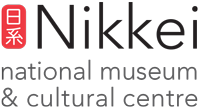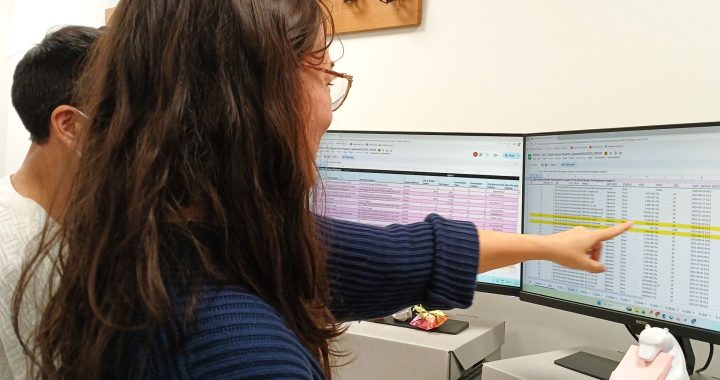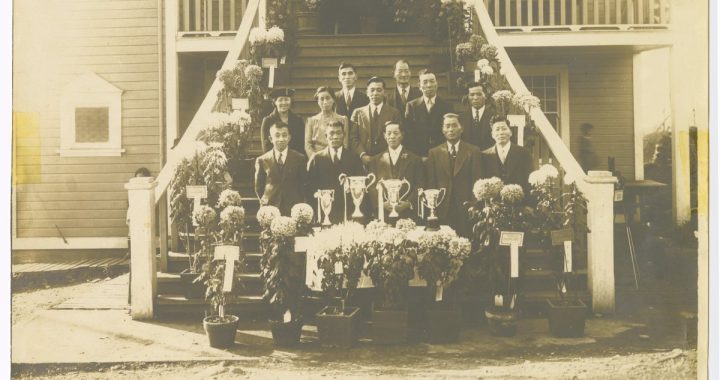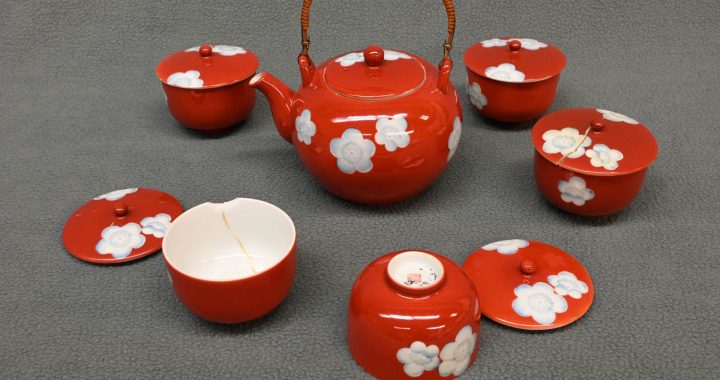The Nikkei National Museum & Cultural Centre is proud to announce the completion of our 2022-2023 digitization project Tegami: Reaching Out Across Distance. Over the last year, we digitized significant materials from the Eiji Yatabe Collection and Shinobu Family Fonds (collections), with a particular focus on hundreds of letters written during the 1940s forced uprooting and dispossession. Over forty of these letters are between close friends Mariko Tokunaga and Kazuko Shinobu, following each girl from their arrival at internment camps in the midst of their high school education to their moves out east to Ontario. With continued support from the Yatabe family, these letters and other items are now digitized and available for viewing in our database at nikkeimuseum.org.
Thank you to the University of British Columbia’s Irving K Barber BC History Digitization Program for their support.
The project team is Sherri Kajiwara, Lisa Uyeda, and Sam Frederick.
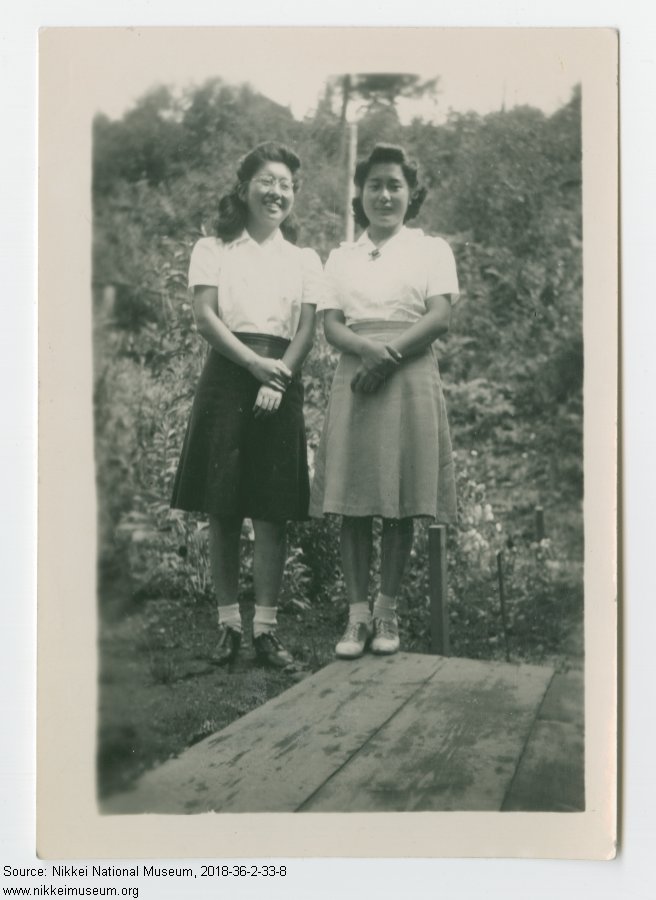
Mariko Tokunaga and Kazuko Shinobu, circa 1940. Eiji Yatabe Collection, NNM 2018.36.2.33.8

Letter from Mariko Tokunaga (Slocan, BC) to Kazuko Shinobu (Vancouver, BC), 18 June 1942. Eiji Yatabe Collection, NNM 2018.36.2.13.8.2
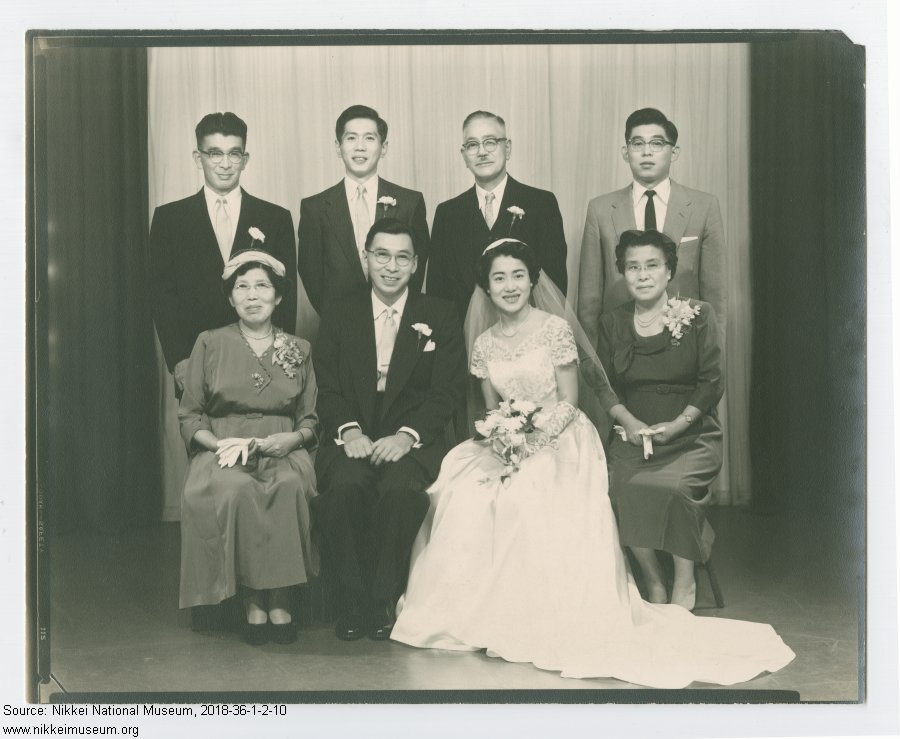
Eiji Yatabe and Kazuko Shinobu Wedding, 1955. Eiji Yatabe Collection, NNM 2018.36.1.2.10
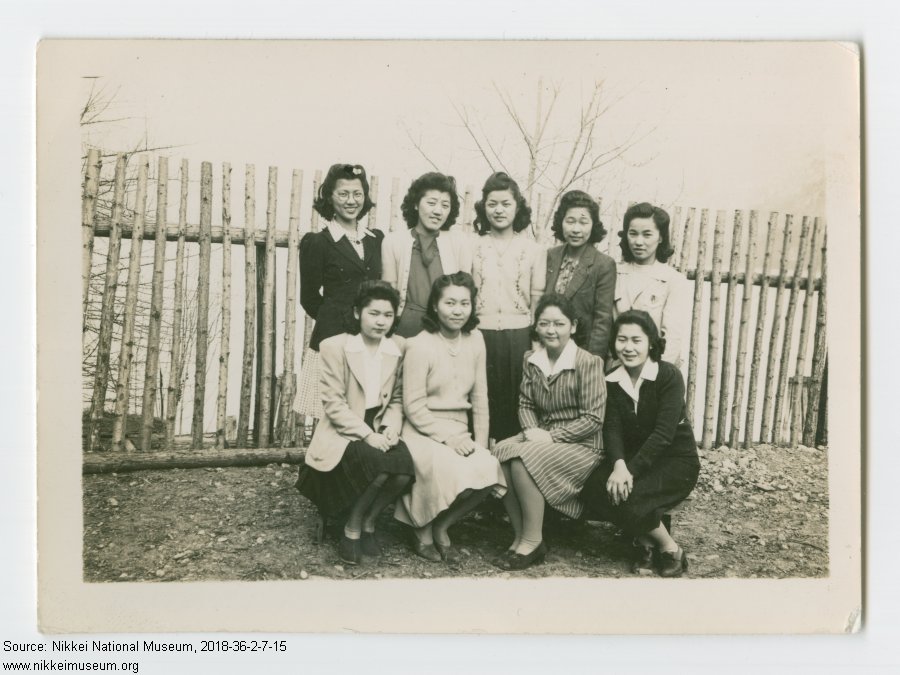
A Group Portrait of Kaslo Teachers, circa 1943. Eiji Yatabe Collection, NNM 2018.36.2.7.15
When Japanese Canadian families were forcibly removed from their homes and sent to internment camps, many students were abruptly torn away from their schooling. With limited funding for schools and few teachers in the camps, Hide Hyodo Shimizu, an experienced teacher, provided teacher training for young women. The Eiji Yatabe Collection contains many photographs and letters from these young teachers.
The women in this photograph each taught in Kaslo, BC: Ayako (Atagi) Higashi, Nobuko (Toda) Ozaki, Amy (Yamazaki) Kondo, Sue (Matsugu) Kai, Naka (Suzuki) Sasaki, Betty (Shinohara) Asano, Molly (Fujita) Tanaka, Ayako (Sato) Kuwahara, and Kazuko (Shinobu) Yatabe.
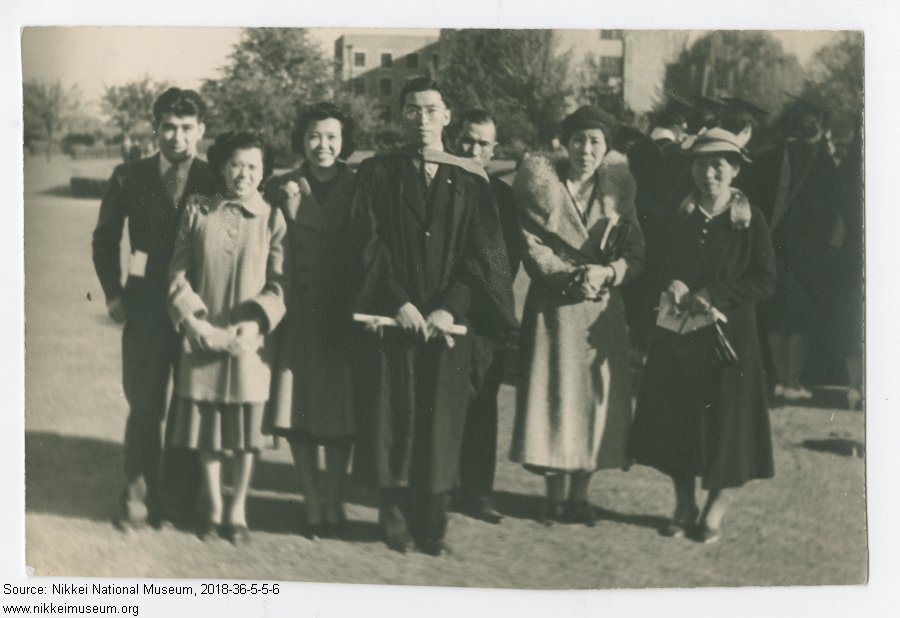
Eiji Yatabe and Family at Graduation ; 1939. Eiji Yatabe Collection, NNM 2018.36.5.5.6.
Eiji Yatabe received a Master of Applied Science in Chemical Engineering in 1939 from the University of British Columbia, becoming the first Japanese Canadian to earn a master’s degree from UBC. He is pictured here on his graduation day along with family and friends.
In 1942, Eiji and his family were forcibly relocated to Ontario after being ordered to leave their home in Vancouver. Eiji would later serve in the Canadian Army overseas before returning to Ontario to work for Atomic Energy of Canada Limited.
Explore more from the Eiji Yatabe Collection.
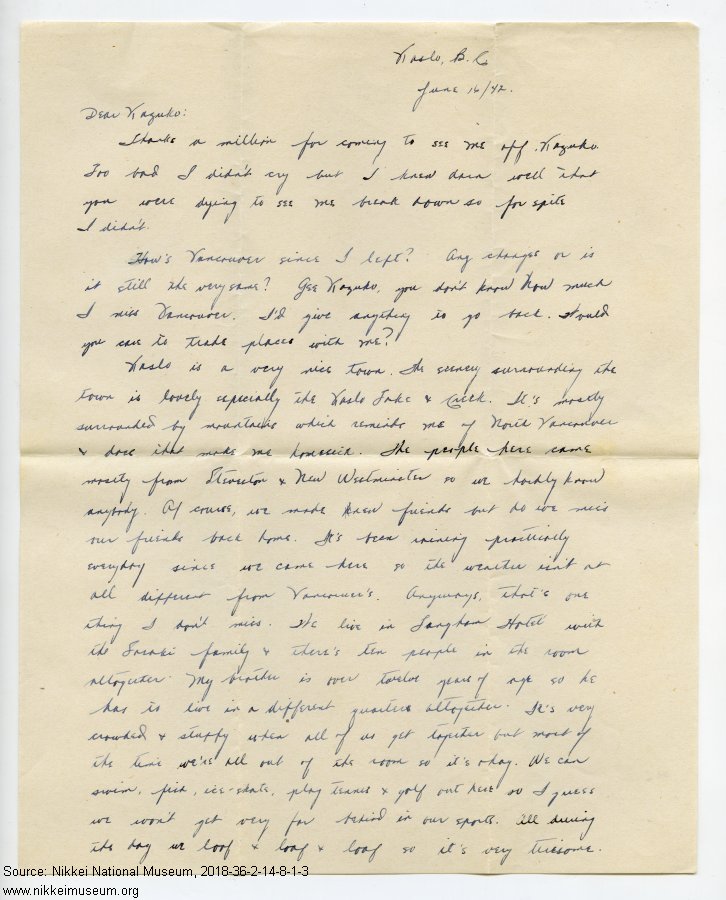
Letter from Eiko Nobuoka (Kaslo, BC) to Kazuko Shinobu (Vancouver, BC) ; 16 June 1942. Eiji Yatabe Collection, NNM 2018.36.2.14.8.1
The Eiji Yatabe Collection contains over one hundred letters written during the 1940s forced uprooting and dispossession, when many Japanese Canadians were sent to internment camps. Eiko Nobuoka was interned in Kaslo, BC and sent this letter to Kazuko Shinobu after her arrival, writing, “Gee Kazuko, you don’t know how much I miss Vancouver. I’d give anything to go back.” Eiko and Kazuko would both later graduate from Kaslo High School in 1943. Explore this letter and more from the Eiji Yatabe Collection.
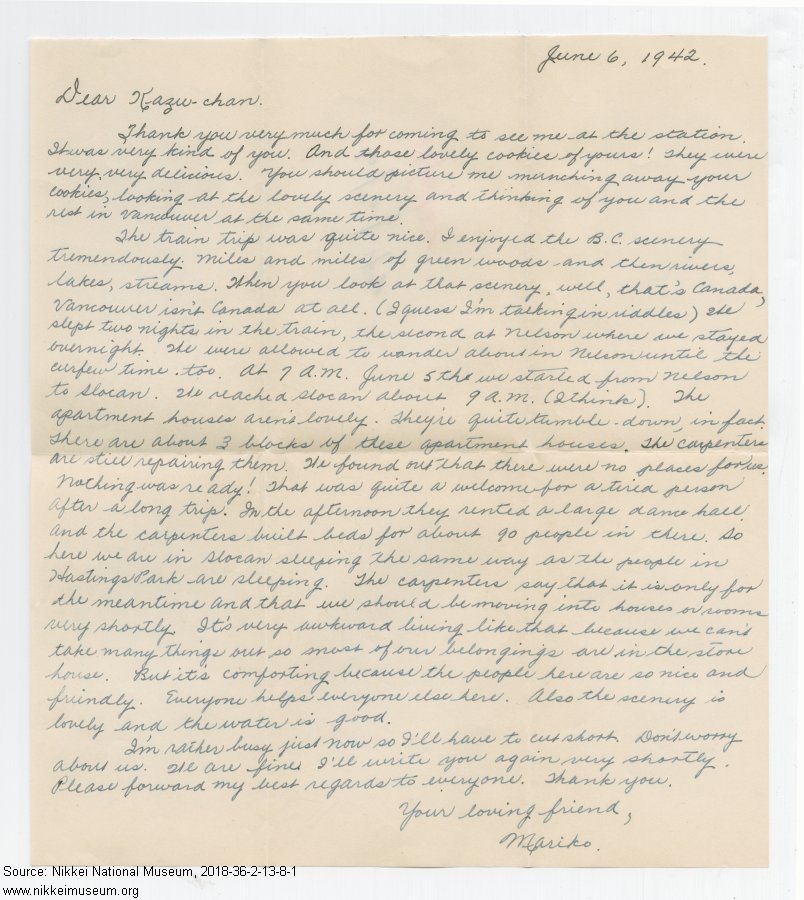
Letter from Mariko Tokunaga (Slocan, BC) to Kazuko Shinobu (Vancouver, BC) ; 6 June 1942. Eiji Yatabe Collection, NNM 2018.36.2.13.8.1
Mariko Tokunaga and Kazuko Shinobu were good friends and classmates at Britannia High School in Vancouver, BC, before they and their families were forcibly sent to internment camps. In this letter, Mariko describes her first impressions of Slocan and how similar the sleeping conditions are to Hastings Park. Explore this letter and more from the Eiji Yatabe Collection.
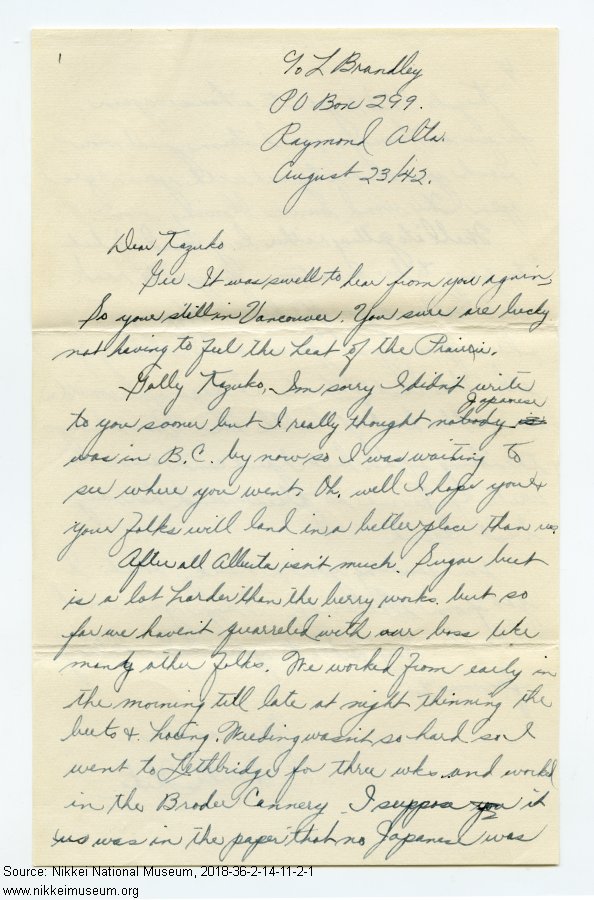
Letter from Martha Ikeda (Raymond, AB) to Kazuko Shinobu (Vancouver, BC), 23 August 1942. Eiji Yatabe Collection, NNM 2018.36.2.14.11.2
Martha Ikeda and her family were one of many Japanese Canadian families sent to Alberta to endure laborious conditions on sugar beet farms. In this letter from August 23, 1942, Martha writes about the prairie heat and her work on the farm and in a cannery. Explore this letter and more from the Eiji Yatabe Collection.

Letter to Kazuko Shinobu (Toronto, ON) from Naomi Tanaka (Tashme, BC) ; 29 May 1945. Eiji Yatabe Collection, NNM 2018.36.1.8.36
Naomi Tanaka and her family were interned in Kaslo, BC and later Tashme while her father was sent to Angler, ON as a prisoner of war. Naomi sent this letter to Kazuko Shinobu shortly after arriving in Tashme, writing “I’m taking to Tashme like a duck takes to desert.” Explore this letter and more from the Eiji Yatabe Collection.
More information about the Tegami project
The Tegami: Reaching Out Across Distance digitization project contains valuable materials from the Eiji Yatabe Collection that document the economic & industrial, historical, and military history of Japanese Canadians in British Columbia as well as overseas. During the Second World War, Japanese Canadians were forcibly removed, interned, sent to work on forced labour projects, and illegally dispossessed of their property and possessions. The unjust treatment by the Canadian Government to Canadian Citizens resulted in many British Columbians forever losing family photographs and documents, and being forced to live outside of the Province; the affects of which continue to be felt by the community today. The records selected for this digitization project capture the details and emotions experienced by Japanese Canadians during the forced uprooting and separation from family and friends; the fight for their rights to education and job opportunities; and their service in the Canadian Military.
Eiji Yatabe was a veteran who served as a soldier, along with his brother Min Yatabe, for the Canadian Army during the Second World War. He is the husband of Kazuko Yatabe (married November 1955), and son-in-law to Saburo and Sada Shinobu, community leaders who fought tirelessly and won the Franchise for Japanese Canadian veterans from the First World War. As a Canadian veteran, many of Eiji Yatabe’s records contain files relating to his service in the S-20 Canadian military language school and the Canadian Army, including wartime letters and photographs; memoirs of service overseas; autograph books; and correspondence with the S-20 and Nisei Veterans’ Associations. Also included in this collection are records of his education, including his Master of Science degree—the first master’s degree to be earned by a Japanese Canadian person at the University of British Columbia—; correspondence between him and Japanese Canadian community members after the Second World War; and materials such as personal items, written military release permissions, and postcards.
Kazuko Yatabe is Eiji Yatabe’s wife and Saburo and Sada Shinobu’s daughter. During the Second World War she was interned with her family in Kaslo, BC. As a recent high school graduate, Kazuko and many others supported the fight for education for all students in the internment camps and enrolled to be teachers to the younger students. Kazuko’s records consist of her education notes; letters of correspondence between family and friends during her teacher training led by Hide Hyodo Shimizu; letters from her students; letters to fellow teacher’s sharing their stories and lessons; autograph albums containing words of encouragement, poetry, and illustrations; and photographs. Most notably, Kazuko’s letters of correspondence between family and friends during the forced uprooting often expressed concern about the conditions of the internment camps; their daily activities and health; and included words of thanks for the care packages they would send each other. There is a notable shift in information disclosed in the letters once the Government began to examine each letter and enforce censorship.
